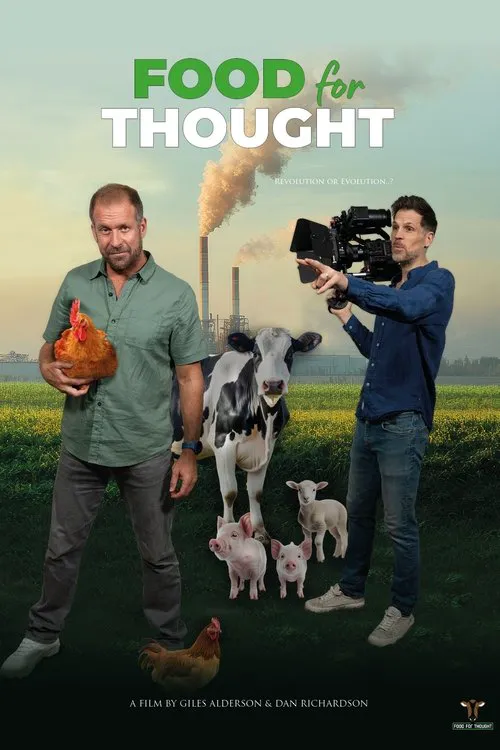Food for Thought

Trama
Food for Thought is a critically acclaimed documentary film that premiered at the 2013 Tribeca Film Festival. The film provides a thought-provoking examination of the vegan lifestyle, shedding light on its profound impact on various aspects of modern society. The film delves into the personal journeys of several individuals, all of whom have adopted a vegan diet for various reasons. We meet vegan celebrities such as Moby, who shares his passion for animal rights and environmental sustainability. Through his story, the film highlights the interconnectedness of social justice, animal welfare, and ecological preservation. One of the main characters in the film is a young mother, Jen, who discovers the benefits of veganism through her son's severe dairy allergy. As she adopts a plant-based diet for her family, Jen encounters numerous challenges, including social isolation and criticism from friends and family. Despite these obstacles, she perseveres, driven by her unwavering commitment to her children's health and well-being. Another poignant narrative thread in the film revolves around David, a former meat-packer turned vegan chef. David's journey serves as a compelling example of personal transformation and redemption. Having worked in the animal agriculture industry for over a decade, he becomes increasingly disillusioned with the cruelty and environmental degradation inherent in the system. David finds solace in the plant-based culinary world, where he can channel his creativity and passion into crafting delicious, compassionate meals. Through these powerful stories, Food for Thought masterfully conveys the complexities and nuances of the vegan movement. Rather than presenting a one-size-fits-all solution, the film acknowledges that individual journeys and motivations vary greatly. Whether driven by altruism, personal health, or a deep sense of connection to animals, every story is unique and genuine. The narrative is complemented by insightful interviews with renowned experts, including Dr. Neal Barnard, Dr. T. Colin Campbell, and Dr. Caldwell Esselstyn. These prominent voices offer compelling evidence for the benefits of a plant-based diet, debunking common myths and misconceptions about veganism. They discuss the link between meat consumption and various chronic diseases, such as heart disease and cancer, as well as the environmental devastation caused by animal agriculture. The film also tackles the more sensitive issues surrounding veganism, such as body shaming and disordered eating. Through interviews with individuals who have struggled with disordered eating, the film highlights the importance of self-care, body acceptance, and a balanced approach to veganism. These thoughtful explorations demonstrate that the film is not merely an advocacy piece but a nuanced examination of a lifestyle that is as complex as it is compelling. The film's approach is neither dogmatic nor preachy; instead, it encourages empathy and understanding. By sharing the personal stories of individuals from diverse backgrounds, Food for Thought creates a sense of connection and community among viewers. This inclusive atmosphere allows audiences to reflect on their own relationships with food, animals, and the environment, stimulating meaningful discussions and introspection. Food for Thought features beautiful, evocative cinematography that captures the vibrant colors and diverse cultures of the vegan movement. From bustling vegetarian restaurants in New York City to serene farms in rural areas, the film's visuals are a feast for the eyes, highlighting the abundance and wonder of plant-based cuisine. The score is an equally integral component of the film's atmosphere, with a range of genres and styles carefully selected to complement the narrative's emotional depth. The music swells during poignant moments, such as when Moby shares his harrowing experiences as an animal advocate, and subsides during more lighthearted scenes, showcasing the camaraderie and joy of the vegan community. Ultimately, Food for Thought is a testament to the transformative power of compassion, community, and a commitment to justice. By exploring the personal stories and experiences of those who have chosen the vegan path, the film inspires viewers to examine their own values, relationships, and daily choices. The film is a gentle nudge, encouraging audiences to consider the implications of their actions and to join a growing community of individuals passionate about creating a more sustainable, compassionate world. Whether you identify as vegan, vegetarian, or simply curious about the lifestyle, Food for Thought is an engaging, thought-provoking exploration that will leave you inspired, motivated, and eager to engage with others about the many benefits and rewards of a plant-based life.
Recensioni
Raccomandazioni




